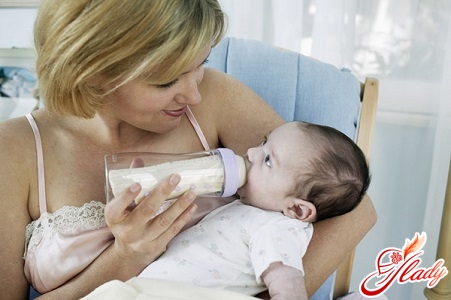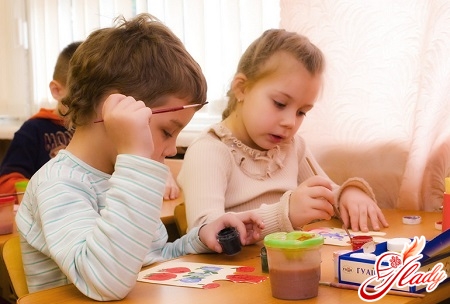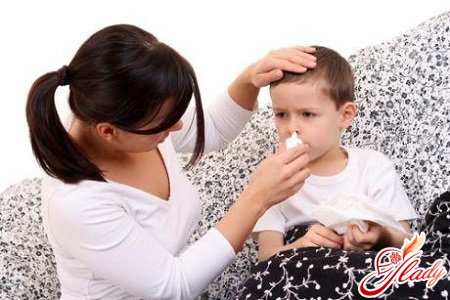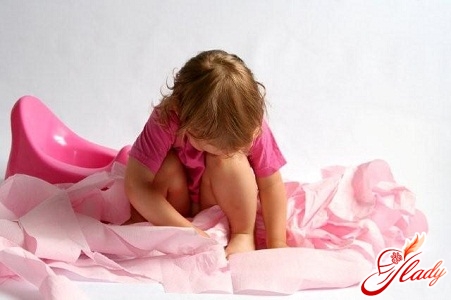 Children's well-being is the main concernall parents without exception. And young children very often give parents an excuse for anxiety - it hurts the neck, then snot, and even at all: diarrhea or vomiting will begin. And my mother needs to know how to provide first aid to her child, before the arrival of a doctor. However, in order that the mother could provide the child with the necessary help, she should know what could have caused the appearance of diarrhea or vomiting. Yes, and help, too, must be provided competently - otherwise the state of the child can significantly deteriorate. This is exactly what will be discussed in this article - vomiting in a child without fever and diarrhea, just diarrhea, or all the symptoms accompanied by an increase in body temperature.
Children's well-being is the main concernall parents without exception. And young children very often give parents an excuse for anxiety - it hurts the neck, then snot, and even at all: diarrhea or vomiting will begin. And my mother needs to know how to provide first aid to her child, before the arrival of a doctor. However, in order that the mother could provide the child with the necessary help, she should know what could have caused the appearance of diarrhea or vomiting. Yes, and help, too, must be provided competently - otherwise the state of the child can significantly deteriorate. This is exactly what will be discussed in this article - vomiting in a child without fever and diarrhea, just diarrhea, or all the symptoms accompanied by an increase in body temperature.
Features of diarrhea in a child
There is a huge amount ofvarious factors that can lead to the development of diarrhea in the child. These include intestinal infections, food poisoning, and worm infestation, or lactose insufficiency, stress, the intake of certain medications and others. The stool for diarrhea in a child can also be different both in color and smell, and in consistency. These indicators depend on what was the reason for the disorder of the intestine. The stool of a child can be as liquid, almost watery, and mushy, brown, or greenish, and in rare cases - even white. The chair can be very greasy, shiny, with pieces of unboiled food. The smell of the stool can also vary greatly - from a complete lack of odor to sour or completely rotten. According to the consistency of a child's chair, an experienced doctor can very likely assume that it was the cause of the disease. So, for example, if a child suffers from rotavirus infection, his stool is usually frothy, it can be colored in different colors - with amoebic dysentery color of crimson jelly, with salmonellosis - the color of marsh mud, with hepatitis - and completely white. However, of course, no doctor will diagnose the disease solely on the basis of the color and odor of the stool - he will conduct all necessary examination. Not the least role is played by the absence or presence in the child of vomiting and temperature - these indicators are also taken into account in the diagnosis. Especially often diarrhea affects children under the age of one year. And this phenomenon has several objective explanations that parents must take into account:
- Violation of personal hygiene and sanitary norms
The most common cause of diarrhea inInfant children are the elementary neglect of parents by sanitary norms. Poorly washed hands, dirty nipples or bottles, dirty rattles - all this can cause a gastrointestinal infection.
- Diet
It is very important to carefully monitor the baby's diet. The slightest error - inappropriate quality, composition or amount of food can lead to the development of intestinal frustration. In addition, the peculiarity of the children's digestive system is such that any changes in the diet can trigger an intestinal disorder.
- Sharp change of climatic zone
Even adults, a sharp change in climate transfersvery difficult. And what to say about very young children. Therefore, the doctor in the first two years of life of the child is not advised to plan trips with the child to other climatic zones. Well, if this trip is simply necessary, parents should buy antidiarrheal pharmacological drugs. For children, diarrhea is terrible with such a complication as dehydration. And the younger the child, the worse for him is dehydration. The main signs of dehydration are:
- Increased thirst
When the body is dehydrated, the child canto feel the strongest feeling of thirst. A small child who can not ask to drink, the main indicator is the dry lips of the baby - they can even crack. However, do not rush to give the baby a drink - remember that a large amount of liquid can provoke a vomiting attack. The liquid should be given to the child in small portions - about a teaspoonful, but after a short time - about five to ten minutes. Simply put, the baby must be drunk.
- Skin change
The skin of the child becomes dry and loses its elasticity. However, parents can notice this symptom only with very severe dehydration, which seriously threatens the child's condition.
- Change in urination
Very important diagnostic value fordehydration has the urination of a child. If the child urinates less than 6 times a day, the color of the urine is dark and has a sharp odor, you can suspect significant dehydration. In the presence of dehydration, young children under the age of three years are shown immediate hospitalization. A diarrhea in a child up to a year leads to dehydration in 70% of all cases.
Intestinal infection, food poisoning
Also, vomiting, and diarrhea may appear in the childwith food poisoning or various intestinal infections. In such cases, diarrhea is almost always accompanied by indomitable vomiting, an increase in temperature - sometimes to very significant rates, there are strong pain in the abdominal region. In addition, the general condition of the child also deteriorates to a large extent. The baby becomes apathetic, sluggish, refuses to eat, can almost always sleep. In addition, in recent years, doctors are increasingly faced with acute respiratory diseases with diarrheal syndrome. In such cases, the child has all those symptoms. Which are typical for ARVI - runny nose, cough, sore throat, fever. However, in addition to all these "delights", the child develops diarrhea and vomiting. At the first manifestations of the disease, parents should as soon as possible call a doctor - in young children, dehydration of the body increases rapidly, literally in a few seconds.
Dysbacteriosis of the intestine, irritable bowel syndrome
Another common causethe occurrence of diarrhea in a child is a dysbiosis. Dysbacteriosis is a violation of normal microflora in the intestine. As a rule, the intestinal dysbacteriosis is almost always accompanied by the so-called irritable bowel syndrome. Dysbacteriosis is not so difficult to recognize, it has quite specific symptoms:
- Stomach ache
A child may complain of bursting painsensations in the abdomen. If the baby is small and can not complain of pain, the attentive mother will easily notice the changes in the behavior of the crumbs - he will cry, pinch with his legs.
- Flatulence
- Diarrhea or constipation
Another pronounced featuredysbiosis are alternating constipation and diarrhea. And during diarrhea, the child has a very specific stool - quite liquid, with fragments of undigested food, which has an extremely unpleasant odor. If you have such symptoms, you need to show the child to the doctor who will clarify the diagnosis and prescribe the appropriate treatment. 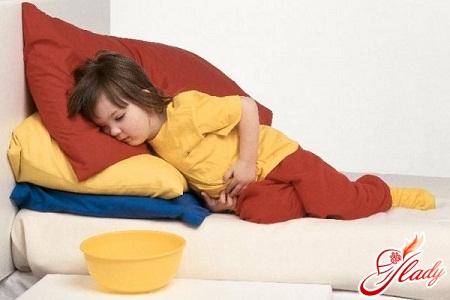
Lactose insufficiency
Also, it is often enoughDiarrhea in the infant is lactose deficiency. This disorder occurs if the body has a reduced content or does not have an enzyme such as lactose. There are several reasons for this disorder, it may be a congenital, inherited, feature of the child's organism, or it may be a consequence of acute infectious infections that the baby has suffered. Also, the disorder can be a consequence of allergic reactions to cow's milk, the result of taking a number of pharmacological preparations. Quite often lactose insufficiency in children of the first year of life is a temporary phenomenon and is caused by physiological immaturity of the intestine. As the child grows up and the intestine ripens, lactose deficiency passes by itself, without any outside interference. In the event that lactose insufficiency is congenital, its symptoms begin to appear already in the first hours of life. During each feeding of the baby, he has a foamy liquid stool with a pronounced sour smell. In addition, the child has intestinal colic, flatulence, belching and almost constant regurgitation, weight loss exceeding the physiological norm. The main indicator of the child's lactose deficiency is the presence of carbohydrates in the feces. Treatment of lactose insufficiency is the observance of a strict diet - the complete elimination of milk from the diet. As a rule, this measure is very effective - already on the second - fourth day the baby disappears diarrhea, vomiting, intestinal colic disappear. Starting from the fifth day the baby starts to gain weight. Remember that the transition to a de-lactose mixture should be smooth - for two to three days.
Gluten enteropathy
This disease is expressed in intolerancea child of gluten - a protein, which is contained in cereals. This disease is usually either inherited, or acquired as a result of intestinal infections or helminthic invasions. As a rule, this disease makes you aware of yourself by the end of the first year of life, when in the diet of crumbs introduced lure from porridge or bread. The baby has such clinical manifestations as a copious foamy stool with a sharp and very unpleasant odor, a decrease in body weight. As the disease progresses, the child develops fat, vitamin and protein deficiency. If the disease was left without attention, it will progress - the child against a background of severe thinning will be an extremely large, swollen abdomen. To treat this disease from the diet of the baby it is necessary to exclude all those dishes that contain any cereals - be it buckwheat, rice or semolina. In addition, the child will be prescribed a number of special pharmacological drugs.
Vomiting in children
And if the diarrhea is more and more less clear, thenvomiting in children causes much more questions. Vomiting in a child can be an absolute trifle, which does not require any kind of anxiety. Or it may be a signal of a serious enough disease requiring immediate medical intervention. Vomiting in a child is never an independent disease. It is only a symptomatic sign of any metabolic diseases, gastrointestinal tract, or a symptom of a general intoxication of the child's body. The cause of vomiting in the child, in addition to those diseases in which there are diarrhea and vomiting, and which have already been mentioned above, is:
- Acute appendicitis
Often, the very first sign of appendicitisinfants is precisely the appearance of vomiting. And in no case should we forget about this possibility - to the great regret, but more recently, more and more doctors are forced to operate about the acute appendicitis of children who have not reached the age of one year.
- Diseases of the central nervous system
Very often, vomiting attacks are a signal ofexisting disorders in the functioning of the nervous system. Most often such disorders are: asphyxia, which resulted in an organic lesion of the central nervous system, increased intracranial pressure.
- Reception of pharmacological preparations
Sometimes vomiting is the response of the bodyon the admission of certain pharmacological drugs. Typically, to determine such a vomiting is not so difficult - it appears within the first hour after taking the medication.
- Pylorospasm
Pyroplasmosis is called spasmodicpylorus, because of which regular emptying of the stomach becomes impossible. This disease is functional. It makes itself felt in the first few days of life. The baby begins vomiting after feeding. However, it is not plentiful, and it does not appear after every feeding. Vomit masses may contain bile ducts. The baby loses weight, but not critical. Girls are prone to this disease more often than boys. The doctor will give the child normal treatment.
- Pylorosthenosis
This disease is characterized by a violationevacuation of stomach contents. This disorder is the grossest pylori of the pyloric part of the stomach, and represents the congenital hypertrophy of the entire muscular layer of the pylorus. This disease, unlike pilorospazma, is much more likely to affect boys. The first time the disease makes itself felt between the second and fourth weeks of life crumbs. After each feeding, the child appears abundant gushing vomiting, and its volume largely exceeds the amount of food eaten. Between meals a constant regurgitation persists. The child very quickly loses weight, his skin becomes so desiccated that it is easily collected into small folds. The baby has regular constipation, and the appetite is significantly increased. In this case, parents should contact the doctor as soon as possible for help - treatment of this disruption of the digestive system is only surgical, and one can not delay a single day.
- Acute gastritis
Grudnikov can lie in wait and suchdisease as an acute gastritis. In this case, the child develops vomiting, which is not accompanied by diarrhea or fever. However, the child can be anxious, because he almost certainly has a stomach ache. In this case, the mother must lay the baby, offer him a drink and call a pediatrician, who will examine the baby and make a decision regarding the further tactics of treating the baby.
- Migraine
All of us have heard about this disease more than once,as a migraine, and perhaps, and themselves periodically suffer from her attacks. But few of the moms guess that a small baby can suffer from the most severe migraine attacks. And they can also be accompanied by vomiting. The correct diagnosis can be made only by an experienced physician - neuropathologist.
- Foreign body
Remember that little children havethe tendency to pull in your mouth all in a row. And it happens that small things a child can swallow. And in the event that a swallowed foreign object is large enough and gets stuck in the esophagus, the child may begin vomiting, caused by a spastic contraction of the smooth musculature of the esophagus. Typically, this kind of vomiting occurs a few minutes after the child has swallowed a foreign body. The child is extremely restless, can begin to cry, his breathing can also be extremely difficult, can begin strong lacrimation. Vomit contains undigested food, and if a foreign object has damaged the mucous membrane of the esophagus, blood veins may appear. If such symptoms appear, parents should promptly call an ambulance team as soon as possible. Strictly speaking, any attacks of vomiting in infants should in no case be left without due attention from the parents. In the event that the child is healthy, he should not have attacks of vomiting. And complaining about a tiny child can not do anything, so vomiting is often the only worrying symptom. Yes, and diarrhea also can not be ignored in any case - after all, in almost all cases it indicates the presence in the child's body of certain pathological processes. Vomiting and diarrhea in the child - an occasion for an urgent call to a doctor! We advise you to read:





